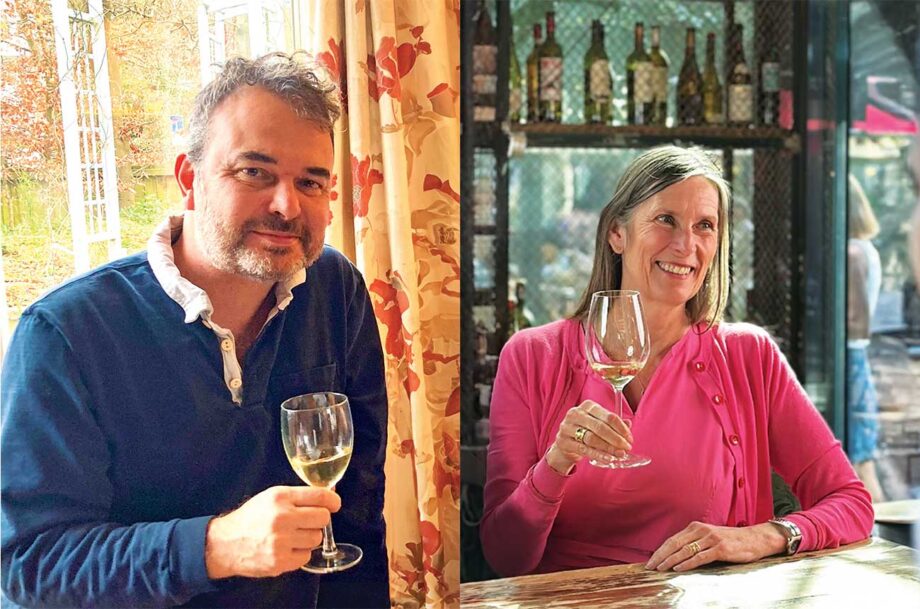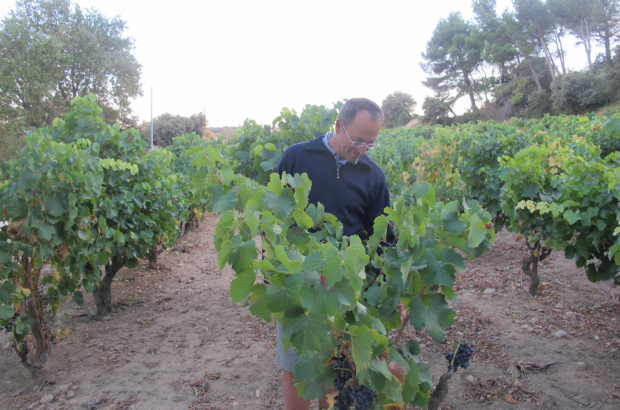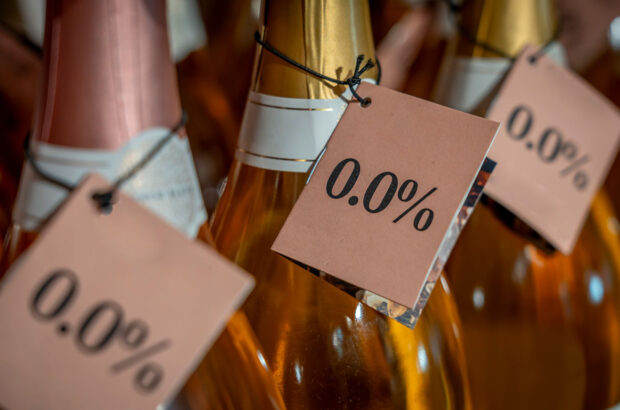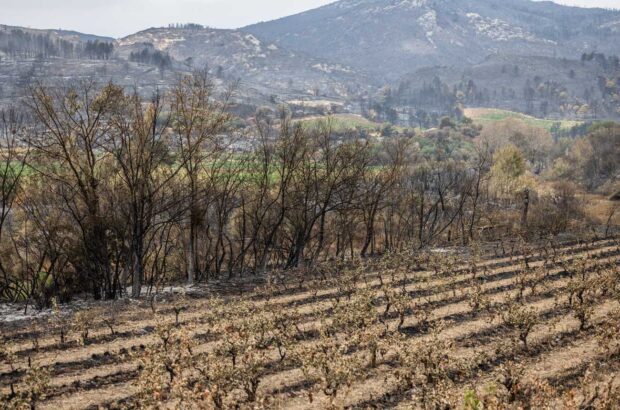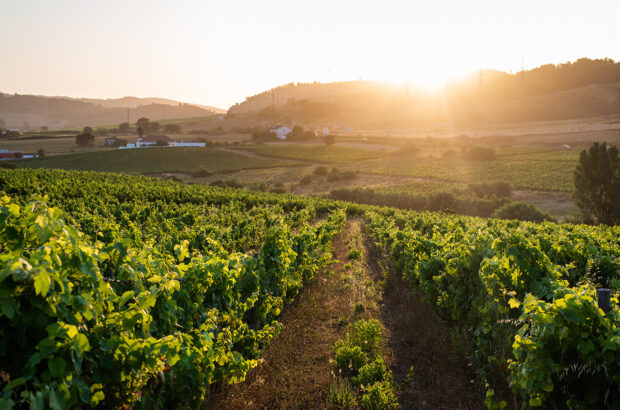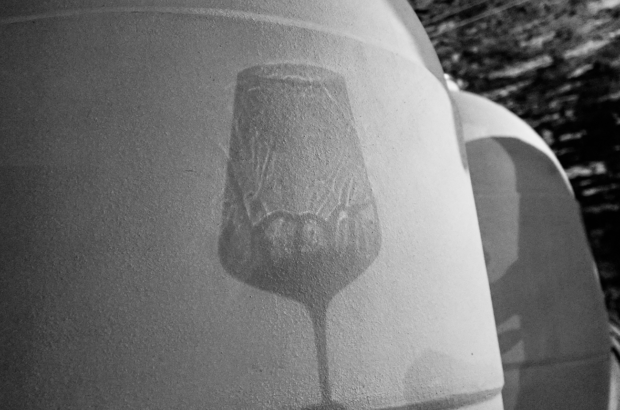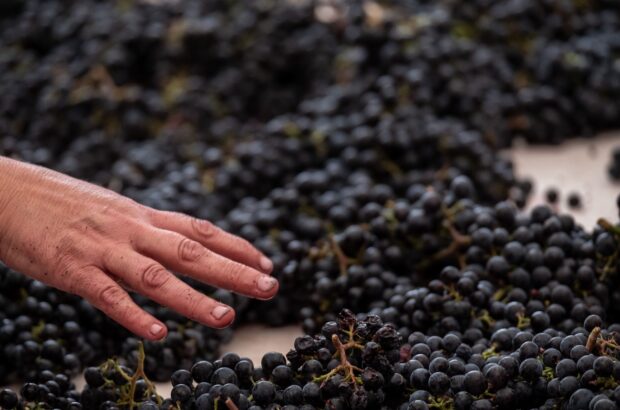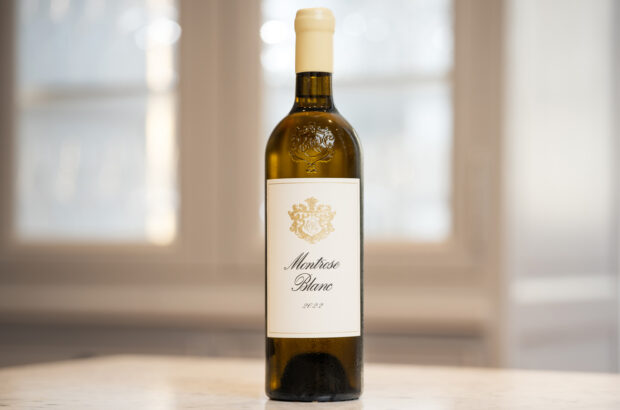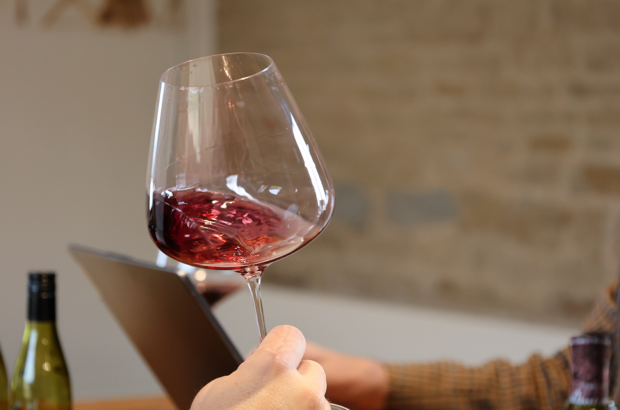‘Anyone who is passionate about wine or enjoys drinking wine should be aware that climate change is having a big impact on wine regions and the style of wines produced,’ says Masters, a buyer at UK wine retailer Majestic with a background in winemaking and biochemistry.
‘It is not a given that Bordeaux will be able to make wine that is recognisable as Bordeaux even in 20 years, certainly not 50 years – and that’s shocking,’ says Neather, a former political speechwriter and the London Evening Standard’s wine critic for 11 years. This seems to me to be as good a reason as any to start thinking about how we can all drink wine more sustainably.
{"content":"PHA+TmVhdGhlciBoYWQgYmVlbiB0aGlua2luZyBhYm91dCB3cml0aW5nIGEgYm9vayBhYm91dCB3aW5lIGFuZCBjbGltYXRlIGNoYW5nZSBkdWUgdG8gdGhlIGluY3JlYXNpbmcgZnJlcXVlbmN5IG9mIGV4dHJlbWUgd2VhdGhlciBldmVudHMgYWZmZWN0aW5nIHZpbmV5YXJkcyB3b3JsZHdpZGUuIEZvciBNYXN0ZXJzLCBhIHNlbGYtcHJvY2xhaW1lZCBuZXJkLCDigJh0aGUgaWRlYSBzdGFydGVkIGZyb20gYSBkZXNpcmUgdG8gdW5kZXJzdGFuZCBhbGwgb2YgdGhlIGRpZmZlcmVudCBhc3BlY3RzIG9mIHN1c3RhaW5hYmlsaXR5IGFuZCBob3cgdGhleSBpbnRlcmFjdCB3aXRoIG9uZSBhbm90aGVyLCBhbmQgdG8gc2ltcGxpZnkgc29tZSBvZiB0aGUgbGFuZ3VhZ2UgYW5kIHRoZSBzY2llbmNlIGJlaGluZCBpdOKAmS48L3A+CjxwPlRvZ2V0aGVyLCB0aGUgcGFpciBoYXZlIHNldCBvdXQgdG8gcGFpbnQgYSBob2xpc3RpYyBhbmQgY29tcHJlaGVuc2l2ZSBwaWN0dXJlIG9mIHRoZSBlbnZpcm9ubWVudGFsLCBzb2NpYWwgYW5kIGVjb25vbWljIGNoYWxsZW5nZXMgZmFjZWQgYnkgdGhlIHdpbmUgaW5kdXN0cnksIHRoZSBlZmZlY3RpdmVuZXNzIG9mIHRoZSBzb2x1dGlvbnMgYW5kIGdvb2QgcHJhY3RpY2VzIGJlaW5nIHRyaWFsbGVkIOKAkyBhbmQgdGhlIHJvbGUgd2Ugd2luZSBkcmlua2VycyBjYW4gcGxheS48L3A+CjxoMj5Qcm9zLCBjb25zIGFuZCB0cmFkZS1vZmZzPC9oMj4KPHA+VGhlaXIgYm9vayBpc27igJl0IGEgbWFuaWZlc3RvLiBJdCBkb2VzbuKAmXQgZGVjbGFyZSB0aGF0IHRoZXJl4oCZcyBhIHNpbmdsZSBzb2x1dGlvbiB0byB0aGUgbXlyaWFkIGNoYWxsZW5nZXMsIGFuZCBpdOKAmXMgbm90IHNlbnNhdGlvbmFsaXN0LiBSYXRoZXIsIGl04oCZcyBpbmZvcm1hdGl2ZSwgZmFjdHVhbCBhbmQgcmVhbGlzdGljLjwvcD4KPHA+PGRpdiBjbGFzcz0iYWQtY29udGFpbmVyIGFkLWNvbnRhaW5lci0tbW9iaWxlIj48ZGl2IGlkPSJwb3N0LWlubGluZS0yIiBjbGFzcz0iaXBjLWFkdmVydCI+PC9kaXY+PC9kaXY+PC9wPgo8cD7igJhBbnlvbmUgY2FuIHBpY2sgaXQgdXAs4oCZIHNheXMgTWFzdGVycy4g4oCYSWYgeW914oCZcmUgaW50ZXJlc3RlZCBpbiB3aW5lLCBpZiB5b3Ugd29yayBpbiB0aGUgd2luZSB0cmFkZSwgZXZlbiBpZiB5b3XigJlyZSBub3QgYSB3aW5lIGRyaW5rZXIsIHRoZSBsZXNzb25zIHRoYXQgeW91IGNhbiBsZWFybiBhcm91bmQgaG93IGdyYXBlcyBhcmUgZ3Jvd24sIGFyb3VuZCBwYWNrYWdpbmcgYW5kIGRpc3RyaWJ1dGlvbiwgYXJlIGFsbCByZWxldmFudCB0byBmb29kIGFuZCBvdGhlciBwcm9kdWN0cy7igJk8L3A+CjxwPk1hc3RlcnMgYW5kIE5lYXRoZXIgbG9va2VkIGF0IGNhc2Ugc3R1ZGllcyBvZiB3aW5lIGJ1c2luZXNzZXMgbWFraW5nIHN1c3RhaW5hYmlsaXR5LWxlZCBkZWNpc2lvbnMgaW4gdGhlaXIgb3BlcmF0aW9ucyDigJMgYmUgdGhhdCBhcm91bmQgY2FyYm9uIGVtaXNzaW9ucywgcGFja2FnaW5nLCBjaXJjdWxhcml0eSBvciBzb2NpYWwgcmVzcG9uc2liaWxpdHkg4oCTIHdlaWdoaW5nIHVwIHRoZSBwcm9zIGFuZCBjb25zLCBhbmQgYWNrbm93bGVkZ2luZyB0aGUgdHJhZGUtb2Zmcy48L3A+CjxwPuKAmEl04oCZcyBxdWl0ZSBlYXN5IHRvIGNvbWUgdXAgd2l0aCBleGFtcGxlcyBvZiBnb29kIHByYWN0aWNlIOKAkyBvbiByZW5ld2FibGUgZW5lcmd5LCBiaW9kaXZlcnNpdHksIGFsdGVybmF0aXZlIHBhY2thZ2luZyDigJMgYnV0IHRoZSBtYWpvcml0eSBvZiB0aGUgaW5kdXN0cnkgaXNu4oCZdCBhY3R1YWxseSBkb2luZyB0aG9zZSB0aGluZ3Ms4oCZIHNheXMgTmVhdGhlci4g4oCYQmVjYXVzZSBzdXN0YWluYWJpbGl0eSBkZWNpc2lvbnMgZG8gaGF2ZSBhIGZpbmFuY2lhbCBpbXBhY3Qu4oCZPC9wPgo8ZGl2IGNsYXNzPSJhZC1jb250YWluZXIgYWQtY29udGFpbmVyLS1tb2JpbGUiPjxkaXYgaWQ9InBvc3QtaW5saW5lLTMiIGNsYXNzPSJpcGMtYWR2ZXJ0Ij48L2Rpdj48L2Rpdj4KPHA+VGhhdOKAmXMgd2hlcmUgTWFzdGVyc+KAmSBleHBlcnRpc2UgY29tZXMgaW46IHdpdGggaGVyIGJ1eWluZyBhbmQgcmV0YWlsIGJhY2tncm91bmQsIHNoZSB1bmRlcnN0YW5kcyB0aGUgY2hhbGxlbmdlcyBvZiBydW5uaW5nIGEgYnVzaW5lc3MsIHNvIHRoZSBib29rIGhvbmVzIGluIG9uIGVjb25vbWljIHN1c3RhaW5hYmlsaXR5LCB0b28uPC9wPgo8cD5Xcml0aW5nIGFib3V0IGNsaW1hdGUgY2hhbmdlIGNvbWVzIHdpdGggaXRzIG93biBjaGFsbGVuZ2VzLiDigJhIb25lc3RseSwgSSBmZWVsIHF1aXRlIGRlcHJlc3NlZCBldmVyeSBtb3JuaW5nLOKAmSBzYXlzIE1hc3RlcnMsIOKAmHdoZW4gSSBoZWFyIGFib3V0IHRoZSBsYXRlc3QgdGhpbmdzIHRoYXQgYXJlIGdvaW5nIG9uLiBPbiB0aGUgb3RoZXIgaGFuZCwgeW91IGhhdmUgYSBjaG9pY2UuIEFtIEkgZ29pbmcgdG8gdHJ5IHRvIGFmZmVjdCBzb21ldGhpbmcgaW4gbXkgb3duIGFyZWEgb2YgaW5mbHVlbmNlLCB3aGVyZSBJIHdvcmsgYW5kIHdoYXQgSSBkbywgYW5kIHdoYXQgaXMgdGhhdCBnb2luZyB0byBiZT\/igJk8L3A+CjxkaXYgY2xhc3M9ImFkLWNvbnRhaW5lciBhZC1jb250YWluZXItLW1vYmlsZSI+PGRpdiBpZD0icG9zdC1pbmxpbmUtNCIgY2xhc3M9ImlwYy1hZHZlcnQiPjwvZGl2PjwvZGl2Pgo8ZGl2IGNsYXNzPSJpbmplY3Rpb24iPjwvZGl2Pgo8cD7igJhJdOKAmXMgcHJldHR5IHRlcnJpZnlpbmcgcmVhbGx5LOKAmSBzYXlzIE5lYXRoZXIsIOKAmGJ1dCB3ZSBkbyB3aGF0IHdlIGNhbiB3aGVyZSB3ZSBhcmUu4oCZPC9wPgo8cD5UaGlzIGJvb2sgZW5jb3VyYWdlcyB1cyB0byBiZSBjaGFsbGVuZ2luZywgdG8gYXNrIHF1ZXN0aW9ucywgdG8gbm90IG1ha2UgYXNzdW1wdGlvbnMgYW5kIHRvIGJlIGN1cmlvdXMg4oCTIGFuZCBhYm92ZSBhbGwsIHRvIGtlZXAgZW5qb3lpbmcgd2luZS48L3A+CjxkaXYgY2xhc3M9ImFkLWNvbnRhaW5lciBhZC1jb250YWluZXItLW1vYmlsZSI+PGRpdiBpZD0icG9zdC1pbmxpbmUtNSIgY2xhc3M9ImlwYy1hZHZlcnQiPjwvZGl2PjwvZGl2Pgo8cD48aW1nIGZldGNocHJpb3JpdHk9ImhpZ2giIGRlY29kaW5nPSJhc3luYyIgY2xhc3M9Imxhenlsb2FkIGJsdXItdXAgYWxpZ25ub25lIHNpemUtZnVsbCB3cC1pbWFnZS01Njc1NDMiIGRhdGEtcHJvY2Vzc2VkIHNyYz0iaHR0cHM6Ly93d3cuZGVjYW50ZXIuY29tLm1hc3Rlci5wdWJsaWMua2V5c3RvbmUtcHJvZC1la3MtZXV3MS5mdXR1cmVwbGMuZW5naW5lZXJpbmcvd3AtY29udGVudC90aGVtZXMvc2ltYmEtdGhlbWUvYXNzZXRzL2ltYWdlcy9wbGFjZWhvbGRlci5wbmciIGRhdGEtc3JjPSJodHRwczovL2tleWFzc2V0cy50aW1laW5jdWsubmV0L2luc3BpcmV3cC9saXZlL3dwLWNvbnRlbnQvdXBsb2Fkcy9zaXRlcy8zNC8yMDI1LzEwL1Jvb3RlZC1pbi1DaGFuZ2UuanBnIiBhbHQ9IkNvdmVyIG9mIFJvb3RlZCBpbiBDaGFuZ2U6IFRoZSBTdG9yaWVzIEJlaGluZCBTdXN0YWluYWJsZSBXaW5lIiB3aWR0aD0iMTMwMCIgaGVpZ2h0PSI0MDAiIGRhdGEtc2l6ZXM9ImF1dG8iIGRhdGEtc3Jjc2V0PSJodHRwczovL2tleWFzc2V0cy50aW1laW5jdWsubmV0L2luc3BpcmV3cC9saXZlL3dwLWNvbnRlbnQvdXBsb2Fkcy9zaXRlcy8zNC8yMDI1LzEwL1Jvb3RlZC1pbi1DaGFuZ2UuanBnIDEzMDB3LCBodHRwczovL2tleWFzc2V0cy50aW1laW5jdWsubmV0L2luc3BpcmV3cC9saXZlL3dwLWNvbnRlbnQvdXBsb2Fkcy9zaXRlcy8zNC8yMDI1LzEwL1Jvb3RlZC1pbi1DaGFuZ2UtMzAweDkyLmpwZyAzMDB3LCBodHRwczovL2tleWFzc2V0cy50aW1laW5jdWsubmV0L2luc3BpcmV3cC9saXZlL3dwLWNvbnRlbnQvdXBsb2Fkcy9zaXRlcy8zNC8yMDI1LzEwL1Jvb3RlZC1pbi1DaGFuZ2UtNjMweDE5NC5qcGcgNjMwdywgaHR0cHM6Ly9rZXlhc3NldHMudGltZWluY3VrLm5ldC9pbnNwaXJld3AvbGl2ZS93cC1jb250ZW50L3VwbG9hZHMvc2l0ZXMvMzQvMjAyNS8xMC9Sb290ZWQtaW4tQ2hhbmdlLTEzNXg0Mi5qcGcgMTM1dywgaHR0cHM6Ly9rZXlhc3NldHMudGltZWluY3VrLm5ldC9pbnNwaXJld3AvbGl2ZS93cC1jb250ZW50L3VwbG9hZHMvc2l0ZXMvMzQvMjAyNS8xMC9Sb290ZWQtaW4tQ2hhbmdlLTMyMHg5OC5qcGcgMzIwdywgaHR0cHM6Ly9rZXlhc3NldHMudGltZWluY3VrLm5ldC9pbnNwaXJld3AvbGl2ZS93cC1jb250ZW50L3VwbG9hZHMvc2l0ZXMvMzQvMjAyNS8xMC9Sb290ZWQtaW4tQ2hhbmdlLTYyMHgxOTEuanBnIDYyMHcsIGh0dHBzOi8va2V5YXNzZXRzLnRpbWVpbmN1ay5uZXQvaW5zcGlyZXdwL2xpdmUvd3AtY29udGVudC91cGxvYWRzL3NpdGVzLzM0LzIwMjUvMTAvUm9vdGVkLWluLUNoYW5nZS05MjB4MjgzLmpwZyA5MjB3LCBodHRwczovL2tleWFzc2V0cy50aW1laW5jdWsubmV0L2luc3BpcmV3cC9saXZlL3dwLWNvbnRlbnQvdXBsb2Fkcy9zaXRlcy8zNC8yMDI1LzEwL1Jvb3RlZC1pbi1DaGFuZ2UtMTIyMHgzNzUuanBnIDEyMjB3IiBzaXplcz0iKG1heC13aWR0aDogMTMwMHB4KSAxMDB2dywgMTMwMHB4IiAvPjwvcD4KPHA+PGVtPlJvb3RlZCBpbiBDaGFuZ2U6IDxhIGhyZWY9Imh0dHBzOi8vYWNhZGVtaWVkdXZpbmxpYnJhcnkuY29tL3Byb2R1Y3RzL3Jvb3RlZC1pbi1jaGFuZ2UtdGhlLXN0b3JpZXMtYmVoaW5kLXN1c3RhaW5hYmxlLXdpbmUtamFuZS1tYXN0ZXJzLW13LWFuZHJldy1uZWF0aGVyIiB0YXJnZXQ9Il9ibGFuayIgcmVsPSJub2ZvbGxvdyBub29wZW5lciI+PHN0cm9uZz5UaGUgU3RvcmllcyBCZWhpbmQgU3VzdGFpbmFibGUgV2luZTwvc3Ryb25nPjwvYT4gQnkgSmFuZSBNYXN0ZXJzIE1XIGFuZCBBbmRyZXcgTmVhdGhlciBQdWJsaXNoZWQgYnkgQWNhZMOpbWllIGR1IFZpbiBMaWJyYXJ5LCDCozIwwqA8L2VtPjwvcD4KPGhyPgo8aDMgc3R5bGU9InRleHQtYWxpZ246IGNlbnRlcjsiPjwvaDM+CjxwPgo="}


